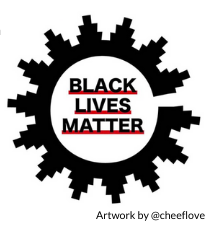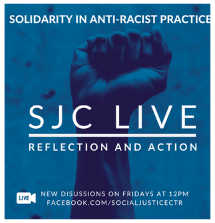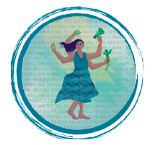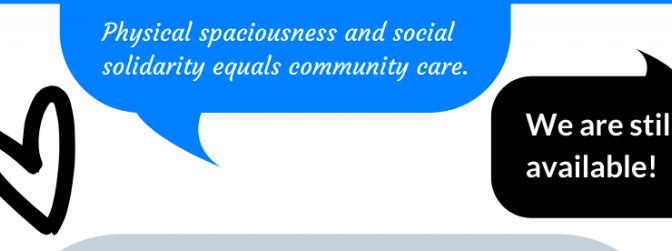Pandemic, Protests, and the Redistribution of Power
The past four months have been a period of significant upheaval for people around the world, including the very communities in which we live, learn, and work. adrienne maree brown describes the pandemic as a period of compression, with those who are able to withdrawing from the world and going into the deep isolation of self-quarantine. adrienne suggests this compression, for some of us, resulted in a return to our truest natures, rediscovering who and what we value most in our lives. Some would say we have experienced a kind of spontaneous attunement to our higher and better selves.
And yet, this compression occurred against the backdrop of indisputable evidence of oppression, direct and structural violence, and systemic racism. We sit in the midst of a schism—a gap between what our higher selves want for our communities and the reality of the lived experiences of those in the margins. The result of this schism is rupture—the kind that creates disorder, shifts consciousness, and activates a desire for reclamation.
It is a time of reclaiming our bodies, our rights, our agency, our land, and our self-determination. This reclamation is revealing itself globally in the form of history-making protest. People around the world have taken to the streets to assert the rights of Black and African American people to exist in their fullest humanity. Many have realized that “none of us are free until all of us are free.” At the same time, the #MeToo movement has been re-energized and survivors are calling for individual and institutional accountability. They are naming names and daring others to live up to their promise of safety, care, and justice.
The pandemic has created an opening for transformative change. Who among us will step into co-creating the future of our deepest desires?
Racial Justice at Emerson
 Echoing POWER’s 2019 social media posts, blackatemerson, a new Instagram account, posed this simple question: “How have professors, administrators, and other Emersonians treated you?” In under a week’s time, over 115 students and alums, a majority who identify as Black or people of color, posted stories of their experiences at Emerson. These testimonies recount ongoing microaggressions, casual uses of the N-word, the fetishization and critique of Black women and their bodies, isolation from consistently being the only Black person in a setting, not seeing themselves reflected meaningfully in curricula, and expressions of what it feels like to be both hypervisible and invisible at the same time.
Echoing POWER’s 2019 social media posts, blackatemerson, a new Instagram account, posed this simple question: “How have professors, administrators, and other Emersonians treated you?” In under a week’s time, over 115 students and alums, a majority who identify as Black or people of color, posted stories of their experiences at Emerson. These testimonies recount ongoing microaggressions, casual uses of the N-word, the fetishization and critique of Black women and their bodies, isolation from consistently being the only Black person in a setting, not seeing themselves reflected meaningfully in curricula, and expressions of what it feels like to be both hypervisible and invisible at the same time.
I am also seeing faculty and staff colleagues of color who carry the weight of supporting students of color, while also being tapped to guide their departments on diversity. All of this is occurring while they struggle to make sense of the ongoing murder and horrible treatment of people who look just like them. The emotional burden carried by students, faculty, and staff of color is tremendous, and yet they continue to do their best work in the context of an environment that every day reminds them that it wasn’t built for them.
This week, I was surprised by a message forwarded to me by a colleague at another institution, a place where I worked for five years. The letter was signed by the Board of Trustees, the President, and all members of the senior leadership team. Here are some of the commitments that college is making in the wake of George Floyd’s murder and their community’s call for racial justice:
- Express support for movements across the nation to put an end to systemic racism, and join with them to say that Black Lives Matter and racial injustice must end.
- Make implicit bias training mandatory for all students, faculty, and staff with commitment from the Board of Trustees to participate in the training.
- Expand curriculum in areas addressing racial injustice, systemic racism, and institutionalized inequality.
- Provide funding for recruitment and retention of faculty and staff of color and for Employee Resource Networks (affinity groups) to strengthen recruitment and retention.
- Institute comprehensive exit interviews with departing faculty and staff of color to identify common themes, and begin an enhanced retention plan.
- Increase access to therapists of color and ensure they understand race-based trauma.
- Review and update training and policies for campus police to ensure empathetic, equitable, and just standard operating procedures.
- Expect to be held accountable for their actions and not to expect colleagues of color—who for too long have shouldered the hard work—to lead this alone.
Only time will tell what actually happens at that institution. Maybe their commitments will lead to real and lasting change and maybe they won’t. Nonetheless, I can’t help but ask what we are willing to do at Emerson to make it the place that represents the aspirations of our better selves?
 Where To Begin?
Where To Begin?
Begin at the beginning by reflecting on your own beliefs and actions. Examine the ways you might be benefitting from the status quo. Then assess the norms, policies, practices of your program, your organization, your department, your office, or your division for the existence of anti-racist practices. If you don’t know what that is referring to or you don’t see any of these practices present, then you know where to begin your work. Here are some thought-provoking resources. Warning: These resources are pointed and direct. They will make you uncomfortable. If they don’t, then you aren’t really doing the work.
Scaffolded Anti-Racist Resources: http://bit.ly/ScaffoldedAntiRacistResources
A word for White People, in Two Parts by adrienne maree brown: http://adriennemareebrown.net
The Characteristics of White Supremacy Culture: https://www.showingupforracialjustice.org/white-supremacy-culture-characteristics.html
Survivor Advocacy and the Importance of Knowing The Landscape
This past week, I have seen a surge in community concern and survivor advocacy about power-based interpersonal violence (PBIV) and the College’s response. Questions were raised about climate in student organizations and the College’s ability to hold student leaders accountable for harms they have caused.
Survivor advocacy is critically important. Not only does it play a role in community accountability, it also serves as a powerful catalyst for change. It was survivor advocacy that sparked the review of College processes in 2014, leading to a detailed Sexual Misconduct Policy, the hire of a full-time Title IX Coordinator, and the creation of the Healing & Advocacy Collective (formerly Violence Prevention & Response). It was survivor advocacy in 2019 that resulted in a Presidential Working Group charged with examining the “sexual misconduct ecosystem” among students. This current wave of advocacy has the potential to result in continued institutional as well as cultural change at Emerson.
As you push forward, please know that survivor advocacy is most effective when grounded in deep knowledge of the landscape, including what the laws and regulations allow and what they limit, what the scope of any relevant policies are, who has responsibility for what, as well as where power is exercised and by whom. As you work to address concerns, look for the root causes of issues by asking yourself why something is occurring. The first answer you come up with is never the root cause. Continue to ask why. Here are some places to start in understanding the landscape:
- Title IX is a federal regulation that prohibits sex discrimination in educational settings that receiving federal funding. Power-based interpersonal violence (PBIV) has historically fallen under these regulations. The regulations will change on August 14, 2020. See: New Title IX Regulations Overview at bit.ly/sjcmessages
- The College must comply with Title IX regulations or risk loss of federal funding. This funding comes largely in the form of financial aid.
- The Sexual Misconduct Policy outlines how reports of PBIV will be addressed by Emerson. See: www.emerson.edu/policies/sexual-misconduct
- The policy does not cover what occurs within student organizations or the student leadership processes. Student orgs are governed by SEAL (www.emerson.edu/seal) and student staff positions are under the purview of many departments across the College.
- In most instances, Emerson’s Title IX Coordinator will not launch an investigation into a report of PBIV without the participation and agreement of the person who has been affected by the harm.
- The Title IX Coordinator is only one of many people at Emerson responsible for the addressing reports of PBIV, the provision of accommodations or supports to people who have been harmed, and the implementation of actions to increase the safety of individuals or the campus community. See Eco-Map for Student-on-Student PBIV at https://bit.ly/sjcmessages,
which details the range of individuals who may have an influence on what occurs in response to a report.
- The Title IX Coordinator does not conduct the actual investigation of reports of PBIV. Investigations are conducted by an internal or external investigator assigned to a case.
- The Title IX Coordinator does not have the authority to impose sanctions on any member of the community. Student sanctions are imposed by a Sanction Panel. Faculty and Staff sanctions are imposed in accordance with Appendix B of the SMP. See: www.emerson.edu/policies/sexual-misconduct#AppendixB
- Most importantly, despite efforts to develop trauma-informed processes and to conduct trauma-informed investigations, this process will never be sufficiently supportive of the people involved. It is a process dictated by federal regulations that was created in the likeness of a flawed legal system.
 If you or someone you know has been affected by power-based interpersonal violence, please feel free to contact Greta or Melanie in the Healing & Advocacy Collective by email: advocate@emerson.edu
If you or someone you know has been affected by power-based interpersonal violence, please feel free to contact Greta or Melanie in the Healing & Advocacy Collective by email: advocate@emerson.edu


 And the people began to think differently. And the people healed. And, in the absence of people living in ignorant, dangerous, mindless, and heartless ways, the earth began to heal.
And the people began to think differently. And the people healed. And, in the absence of people living in ignorant, dangerous, mindless, and heartless ways, the earth began to heal. SJC LIVE is a virtual space for expanding our individual and collective capacities to manifest transformative social change. These Facebook Live conversations seek to center the people and work of racial justice movements, and call us into solidarity through anti-racist action. The videos from our five-part SJC LIVE series on anti-racist practices have been viewed by more than 2400 people, with our recent discussion on Abolition as an Anti-Racist Practice drawing more 600 viewers, including Emersonians out in the world as well as interested people with no connection to Emerson, from as far west as California and as far south as Florida. SJC LIVE is taking a brief hiatus but will be resuming soon with our next series focusing on Power, Violence, and Institutional Betrayals. In the meantime, all SJC LIVE videos can be found on our Facebook page at
SJC LIVE is a virtual space for expanding our individual and collective capacities to manifest transformative social change. These Facebook Live conversations seek to center the people and work of racial justice movements, and call us into solidarity through anti-racist action. The videos from our five-part SJC LIVE series on anti-racist practices have been viewed by more than 2400 people, with our recent discussion on Abolition as an Anti-Racist Practice drawing more 600 viewers, including Emersonians out in the world as well as interested people with no connection to Emerson, from as far west as California and as far south as Florida. SJC LIVE is taking a brief hiatus but will be resuming soon with our next series focusing on Power, Violence, and Institutional Betrayals. In the meantime, all SJC LIVE videos can be found on our Facebook page at  Healing & Advocacy Collective
Healing & Advocacy Collective Elma Lewis Center
Elma Lewis Center Identity-Based Harm (Bias) Incident Reports
Identity-Based Harm (Bias) Incident Reports Title IX Access & Equity Reports
Title IX Access & Equity Reports The Pandemic is Portal – A Conversation with Arundhati Roy, Hosted by Imani Perry
The Pandemic is Portal – A Conversation with Arundhati Roy, Hosted by Imani Perry


